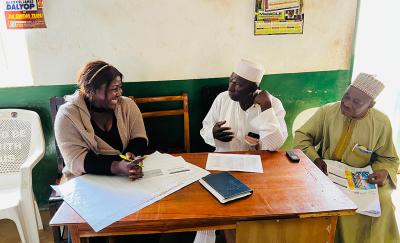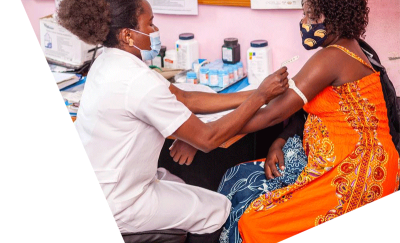Intelligently Advancing International Development with AI



Artificial intelligence (AI) is rapidly transforming many parts of our public and private life, and its impacts will only accelerate. Recently at the AI Safety Summit, the UK government, alongside Canada, the Bill and Melinda Gates Foundation, the U.S. and partners in Africa, made commitments to using AI in international development, including £80M in collaboration.
UK’s AI for Development Programme highlights investing in partnerships that use cutting-edge technology to address global challenges. The Programme, initially focused on Sub-Saharan Africa, has set the target of unlocking benefits for 700 million people, creating or scaling at least eight responsible AI research labs, and helping break barriers of entry for African AI innovators. AI is not new to development though and it has already been used to improve the access to services and the quality of solutions in many countries.
Data are the crux of AI. They are integral to understanding context and delivering the required outputs when working on international development programmes. With AI, big sets of data will be readily available and analysis times will shrink significantly. This will be advantageous for international development organisations, donors, and on-ground stakeholders.
However, there are costs associated with such data analysis. Questions about data sovereignty and data protection will have to be answered before making use of AI. When answered, then the financial cost of hosting tools to perform these tasks while ensuring secure data storage will be a crucial consideration. These are not insuperable obstacles to taking advantage of AI’s benefits and should not stall its progress.
Generally, the full extent of the impact of technological innovations becomes apparent only after their integration into society. For example, cars were on the road in the early 1900s, but the seatbelt was introduced only in 1959 after safety concerns grabbed headlines. Certain costs of technology can be anticipated while others have to be absorbed as technology evolves.
Another important aspect to investigate when working on data supplemented by AI is that of biases within the data. AI uses training data sets to learn and train itself. As already known, especially if working in international development, the world is filled with biases and inequalities, which translate into the data that’s used. Instead of providing a way forward, this could reinforce stereotypes that most international development professionals have spent their careers trying to change.
These issues will require shrewd navigation to ensure equitable outcomes as AI inevitably finds its way into all sectors. One solution is for organizations with inclusive data to contribute to the training data sets that international development firms will use. This could be by consentually sharing the data that they already have or collecting data where required.
More training data implies more accurate data, but that is true only if the training data are diverse and inclusive. Treading constructively, organisations such as Abt that work with underrepresented communities can provide data sets with a keen focus on inclusiveness and quality over quantity. Including these communities in the AI process from design to evaluation can mitigate bias concerns. The quality over quantity approach would result in lesser amount of data needing to be sThis will consume less energy and in turn work towards controlling the large carbon footprint that AI has already created and provide more fruitful representation.
While AI’s potential drawbacks are undeniable, so are its enormous potential benefits. Consider the work of Local Health System Sustainability (LHSS), a flagship program Abt leads in Ukraine where we're working with the Government of Ukraine under their implementation plan for the Development of AI. Through this and the National Telemedicine Strategy, LHSS has provided expertise to revise the legislation on the use of AI to provide medical rehabilitation, primary healthcare, and emergency care.


LHSS Ukraine in partnership with the Ministry of Health of Ukraine and BrainScan SA (Poland) is also working to increase access for health providers to medical imaging that uses AI. This utilises the fast computation speeds of AI as a support for professionals working in time-sensitive situations. BrainScan uses AI algorithms to analyse CT scans of the brain and automatically identifies possible pathological changes. Given the limited number of radiologists, this system reduces the workload of medical staff and improves diagnostic quality. Working with the government and utilising AI as a tool, we are incorporating AI to enable positive outcomes without relying on it to do all the work and control all the data we work on.
Ukraine provides evidence of the important potential benefits of AI. Its implications are expansive, more unknown than known. What we do know is how previous technological innovations have impacted society as a whole and as usual, the most harmed are those at the intersections of inequalities and biases. When change at this scale is on the horizon, we need to question not just the policies that will be in effect for regulation but also the integrity and motivations of those who need to uphold it. At Abt, we understand the potential positive uses of AI but take precautions for its use. The guidelines of how we aim to work with it are here. These guidelines are dynamic in nature. They will continuously evolve as AI does so that we can work with it pragmatically, effectively, and safely to produce the outcomes that our clients and the communities they serve want and need.
Read More

Pathways to UHC: Nigeria’s State and Local Approaches to Financing Integrated HIV Services and Primary Health Care
Nigeria’s state and local government-driven approaches to integrated primary health care are transforming financial protection and access for vulnerable populations, setting a replicable model for sustainable universal health coverage.

Global Digital Health Forum (GDHF) 2024
Abt Global is sponsoring and presenting at the Global Digital Health Forum (GDHF) 2024.

Building Climate Resilience Through Private Sector Partnerships
The Partnership for Climate Action, led by USAID CACCI, helps the private sector contribute to climate resilience through investment and innovation.

The Alliance for LGBTQI+ Inclusive Development presents The Impact of Geopolitical Shifts on Inclusive Development
Abt Global is hosting the upcoming hybrid LGBTQI+ Inclusive Development Summit on November 19, 2024.